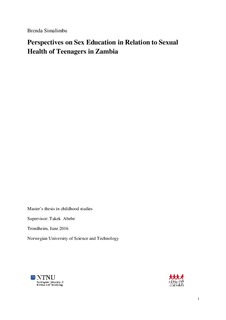| dc.description.abstract | This research explores the perspectives on sex education in relation to sexual health of
teenagers in Zambia. The research aimed at exploring the perspectives of various
stakeholders (teenagers, parents, teachers, pastors and traditional counsellors) on the role of
sex education to promote the sexual health of young people in Zambia. The study is guided
by the theoretical perspectives of the sociology of childhood, which consider childhood as a
social construct and children as social actors capable of constructing their own social lives
and the lives of those around them. The rights based approach is also employed focusing on
the protection rights, right to health and participation rights. The ecological system theory is
also part of the study to explore how the interactions and relationships of different
environments can affect the teaching of sex education.
The study used qualitative research methods drawing 43 participants from Ndola district of
Zambia. Methods used were body maps with 12 teenagers, focus group discussions with 32
teenagers and semi structured interviews with 12 teenagers, 4 parents, 2 teachers, 2 pastors
and 2 traditional counsellors. Un structured observation was used as an accompaniment to all
the three methods used in the study to capture the body language and culture behaviour
exhibited by participants during data collection period.
The study revealed that mothers or female guardians are more involved in sex education than
fathers who are constrained with productive work and the culture aspect, which does not
allow men to discuss sexual matters with especially their daughters as it was considered
taboo. Other sources of information on sexuality for teenagers were the media, friends and
school where they got more information, as the one from parents was more of the negative
part of sex with emphasise on the effects of premarital sex such as pregnancies and sexually
transmitted diseases. Findings show that society was not comfortable with information
coming from friends and the media as it might not give accurate information, thus they were
more comfortable with the school to take up sex education. School was seen as a better place
to capture a lot of teenagers, offer evidence based and correct harmful sexual practises such
as the use of herbs by women to tighten vaginas and having multiple sexual partners as a way
of gaining experience by men. However due to the influence of Christianity schools have put
more emphasis on abstinence as the only way to avoid pregnancies and sexually transmitted
diseases. On the other hand, tradition encourages boys to practise premarital sex to gain
experience but both Christianity and tradition does not allow the use of contraceptives
making it hard for the school and society to provide contraceptives to the young people. Nonavailability of contraceptives has disadvantaged young people who are sexually active putting
their sexual health at risk. These findings have important implications for policy makers to
try to implement measures on the teaching of sex education that will cater for needs of the
young people including those who are already sexually active to try to improve the sexual
health of teenagers in Zambia. | nb_NO |
